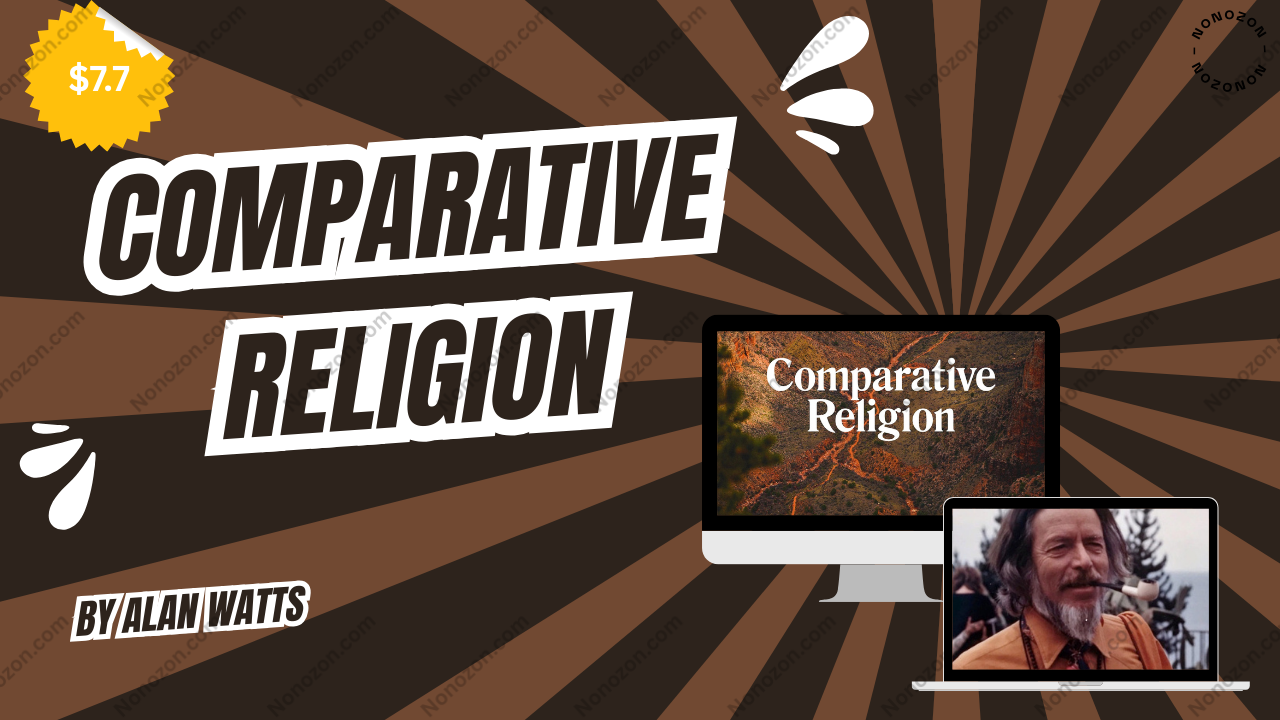Comparative Religion
by Alan Watts
Get Comparative Religion by Alan Watts Digital Download!
You can check proof of content here

Comparative Religion by Alan Watts
Overview

Alan Watts on Comparative Religion: A Journey Through Spiritual Universality
Alan Watts, a philosopher celebrated for bridging Eastern and Western thought, made lasting contributions to the study of comparative religion. His engaging lectures and writings emphasize the profound similarities among the world's spiritual traditions. Rather than focusing on doctrinal divisions, Watts encourages a deeper exploration of the universal longing for meaning and spiritual awakening found across cultures.
Known for his charisma and clarity, Watts had a unique gift for simplifying complex ideas—often with humor and vivid metaphor. His lecture series, Four Ways to the Center, is a prime example, guiding listeners through diverse religious paths that all aim toward the same goal: a deeper understanding of the self and the cosmos.
In an age where religious identities often clash or divide, Watts’s message remains vital. His approach fosters appreciation for the rich variety of spiritual traditions and the shared human desire for transcendence.
Discovering Universal Themes Across Religions
At the heart of Watts’s work is the recognition that beneath their surface distinctions, world religions often address the same fundamental questions. By comparing systems like Taoism and Zen Buddhism with Christianity and other Western faiths, Watts highlights key themes that cut across theological boundaries.
These include:
Interconnection of All Things: Spiritual traditions often speak to the unity of existence. In Hinduism and Buddhism, this is seen in the doctrine of interdependence; in Christian mysticism, in the idea of divine oneness.
Spiritual Awakening or Salvation: Whether it's the quest for nirvana in Buddhism or salvation in Christianity, religions seek to move the individual beyond ordinary existence to a more awakened state.
The Role of Rituals and Symbols: Religious practices, from meditation to sacraments, act as symbolic journeys toward the sacred. These rituals serve as tools for embodying deeper truths.
Watts’s perspective invites us to appreciate these shared spiritual goals and expressions. Rather than viewing religions as competing ideologies, we can see them as parallel responses to the same existential questions.
Humor as a Tool for Spiritual Insight
One of Watts’s most disarming yet powerful tools is his use of humor. He often infused lectures with irony and playful storytelling, breaking down barriers that can make religious discourse feel rigid or inaccessible.
For example, Watts would point out the contradictions inherent in strict dogma—such as religious leaders who fall short of the ideals they preach—not to mock, but to reveal the deeper human realities within spiritual systems. This method encourages self-reflection rather than blind acceptance.
Illustrative Moments:
His lighthearted critique of religious hypocrisy invites deeper thought without hostility.
Anecdotes rich in irony encourage audiences to confront their assumptions about truth and faith.
Through this approach, Watts not only makes complex ideas more approachable but also cultivates an environment of open-minded inquiry.
A Foundation of Scholarly and Experiential Depth
Behind Watts’s charismatic teaching style lies a serious foundation in theology, philosophy, and religious history. His formal training, combined with a lifelong curiosity, allowed him to explore traditions from both intellectual and experiential standpoints.
Theological Expertise: Watts had a deep familiarity with religious texts, interpreting them not as literal dictates but as symbolic expressions of the human search for meaning.
Eastern Wisdom for Western Audiences: His accessible explanations of concepts like Tao or karma helped introduce millions of Westerners to Eastern ideas during a time when such perspectives were still obscure in the West.
Far from being merely a popular speaker, Watts offered nuanced insight that continues to resonate with scholars, spiritual seekers, and anyone exploring life's bigger questions.
Exploring Differences and Common Ground
In his comparative approach, Watts carefully identifies both distinctions and overlaps among spiritual systems. His aim isn’t to flatten or homogenize beliefs, but to show how varied traditions often speak to the same core truths.
Comparative Glimpse: Buddhism vs. Christianity
| Aspect | Buddhism | Christianity |
|---|---|---|
| Ultimate Aim | Nirvana—liberation from suffering | Salvation—eternal life with God |
| Practice Path | Meditation, mindfulness, ethical living | Faith, repentance, sacramental participation |
| View of Reality | Impermanence, no fixed self (Anatta) | Created universe, divine plan |
| Self-Identity | No enduring self | Immortal soul, created by God |
Rather than seeing these as conflicting viewpoints, Watts encourages us to view them as complementary lenses through which humanity explores life’s mysteries. This outlook promotes deeper spiritual understanding without dismissing difference.
Promoting Interfaith Connection
Watts’s teachings take on renewed significance in today’s pluralistic society. As communities become more diverse, the ability to understand and honor different faiths is crucial for peaceful coexistence. His message emphasizes unity in diversity.
Key ideas supporting this interfaith vision:
Shared Moral Principles: Across religions, there is a shared emphasis on love, compassion, and humility.
Similar Spiritual Practices: Prayer, meditation, fasting, and contemplation are common spiritual tools found across many traditions.
Universal Questions: Every faith grapples with questions of mortality, suffering, purpose, and the divine.
By focusing on these commonalities, Watts cultivates empathy and encourages genuine dialogue between traditions. His work helps break down religious walls, replacing fear or prejudice with curiosity and respect.
Conclusion: A Legacy of Unity and Inquiry
Alan Watts’s exploration of comparative religion offers a refreshing and unifying perspective on spirituality. His unique blend of scholarly depth, philosophical reflection, and approachable language has helped countless individuals navigate the often overwhelming landscape of world religions.
Watts urges us to look beyond religious labels and doctrines to the shared human yearning that underlies them. Whether one seeks enlightenment, salvation, or simply greater understanding, his work provides a guide for exploring diverse traditions with both heart and intellect.
In doing so, Watts does more than analyze religion—he invites us into a conversation that is ancient, ongoing, and deeply human.
Related products

Making Contact, Satir Process, Personal Workbook, Forgiving Parents PDF bundle
by Virginia Satir
$100.00
$38.50

Overcome Neediness, Attachment, Fears (Audio Seminar)
by Apollonia Ponti
$129.00
$15.40


